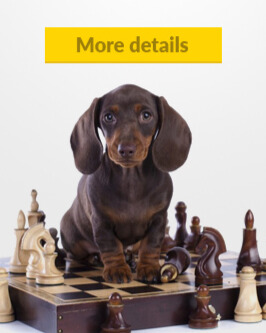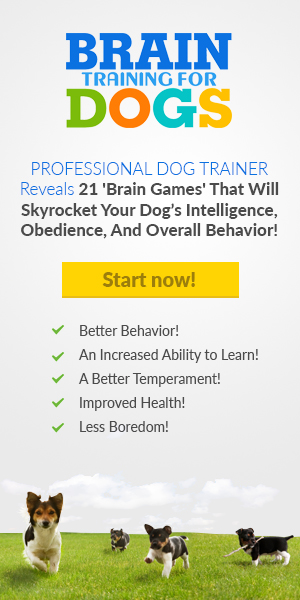Brain Training For Dogs
PET CARE
1/22/20254 min read
Brain Training For Dogs: A Unique Dog Training Course Revolutionizes Canine Education
Brain Training for Dogs offers a unique approach to canine education. This comprehensive course combines scientific principles with practical techniques to enhance your dog's cognitive abilities and behavior. It focuses on stimulating your dog's mind through engaging activities and positive reinforcement methods.
The program covers various aspects of dog training, from basic obedience to advanced problem-solving skills. Developed by professional dog trainer Adrienne Farricelli, it aims to strengthen the bond between dogs and their owners while addressing common behavioral issues.
Brain Training for Dogs provides step-by-step instructions and video demonstrations for each exercise. The course is suitable for dogs of all ages and breeds, making it a versatile option for pet owners seeking effective training solutions.
Fundamentals of Canine Cognition
Dogs possess complex cognitive abilities that influence their behavior and learning processes. Understanding these mental capabilities is crucial for effective training and communication with our canine companions.
Understanding Dog Psychology
Dogs are social animals with unique psychological traits. They form strong bonds with their human families and other dogs. This social nature impacts their learning and behavior.
Dogs communicate through body language, vocalizations, and scent. Recognizing these signals helps owners interpret their pets' needs and emotions.
Canines have a pack mentality, often viewing their human family as their pack. This influences their social interactions and responses to leadership.
The Role of Brain Training in Behavior Modification
Brain training engages a dog's mental faculties, promoting better behavior and cognitive health. It stimulates problem-solving skills and reduces boredom-related issues.
Regular mental exercises can:
Improve focus and attention span
Enhance memory and learning abilities
Reduce anxiety and stress
Strengthen the human-dog bond
Brain training activities include puzzle toys, scent work, and obedience exercises. These challenge dogs mentally, leading to better-behaved and more content pets.
Assessing Your Dog's Learning Style
Like humans, dogs have individual learning preferences. Some are visual learners, others respond better to auditory cues or physical guidance.
Common learning styles in dogs:
Visual: Respond well to hand signals and demonstrations
Auditory: Learn best through verbal commands
Kinesthetic: Prefer hands-on guidance and physical cues
Identifying your dog's learning style enables tailored training approaches. This personalization enhances the effectiveness of training sessions and speeds up the learning process.
Observing your dog's responses to different training methods helps determine their preferred style. Experimenting with various techniques allows you to find the most effective approach for your pet.
Implementing the Training Course
The Brain Training for Dogs course provides a structured approach to enhance your dog's cognitive abilities and behavior. It offers a step-by-step guide for effective implementation and measurable results.
Setting Up a Training Schedule
Consistency is key when implementing the Brain Training for Dogs course. Establish a regular training schedule that fits your daily routine. Aim for 15-30 minute sessions, 2-3 times per day.
Consider your dog's energy levels and attention span when planning sessions. Early morning and evening often work well for most dogs.
Create a dedicated training space free from distractions. This helps your dog focus and associate the area with learning.
Keep training materials organized and easily accessible. This includes treats, toys, and any course-specific equipment.
Progressive Skill Development Exercises
Brain Training for Dogs introduces exercises in a progressive manner, building on previously learned skills.
Start with foundational exercises like "Target Training" and "Look into My Eyes." These establish basic obedience and focus.
Advance to more complex tasks such as "Jazz Up and Settle Down" and "The Airplane Game." These challenge your dog's impulse control and cognitive flexibility.
Example Exercise Progression:
Preschool: Name recognition, basic commands
Elementary: Fetch, hide and seek
High School: Advanced obedience, problem-solving
College: Impulse control, patience
Adjust the difficulty level based on your dog's progress and abilities.
Positive Reinforcement Techniques
Positive reinforcement is central to the Brain Training for Dogs methodology. Reward desired behaviors with treats, praise, or play.
Use a marker word or clicker to pinpoint the exact moment your dog performs correctly. This clarity helps them understand what's expected.
Vary rewards to maintain engagement. Alternate between food treats, favorite toys, and enthusiastic praise.
Timing is crucial. Deliver rewards immediately after the desired behavior for maximum impact.
Avoid punishment or negative reinforcement, as these can hinder learning and damage your bond.
Monitoring Your Dog's Progress
Track your dog's performance throughout the course to ensure steady improvement.
Keep a training journal to record:
Completed exercises
Success rates
Areas needing more practice
New behaviors or skills observed
Use video recordings to review sessions and identify areas for improvement in both dog and handler techniques.
Regularly reassess your dog's skill level and adjust the training plan accordingly. Some dogs may progress faster in certain areas than others.
Celebrate milestones and breakthroughs, no matter how small. This positivity reinforces both your dog's efforts and your commitment to the training process.
Visit https://kulturaff.info/brainydogs to learn more.
The links in this article are affiliate links. This means I earn a small commission if you make a purchase through them, at no extra cost to you. Thank you for supporting my work!
Kultur Home
Enhancing your living space with care and style.
Contact
© 2024. All rights reserved.





